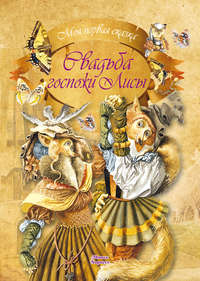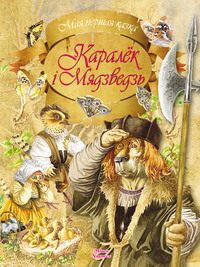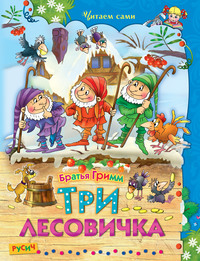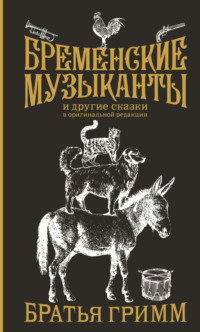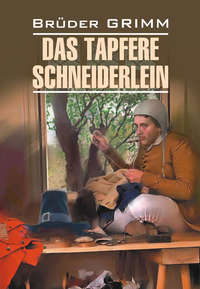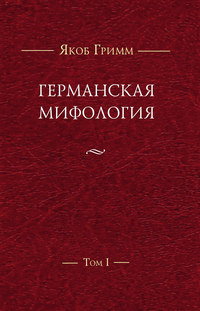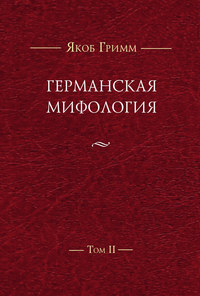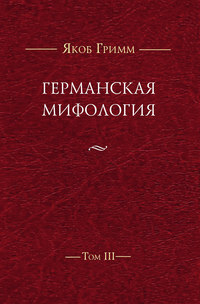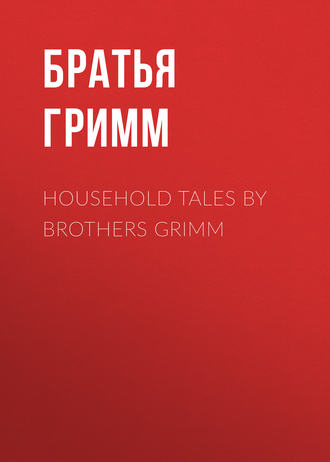 полная версия
полная версияHousehold Tales by Brothers Grimm
62 The Queen Bee
Two kings' sons once went out in search of adventures, and fell into a wild, disorderly way of living, so that they never came home again. The youngest, who was called Simpleton, set out to seek his brothers, but when at length he found them they mocked him for thinking that he with his simplicity could get through the world, when they two could not make their way, and yet were so much cleverer. They all three travelled away together, and came to an ant-hill. The two elder wanted to destroy it, to see the little ants creeping about in their terror, and carrying their eggs away, but Simpleton said, "Leave the creatures in peace; I will not allow you to disturb them." Then they went onwards and came to a lake, on which a great number of ducks were swimming. The two brothers wanted to catch a couple and roast them, but Simpleton would not permit it, and said, "Leave the creatures in peace, I will not suffer you to kill them." At length they came to a bee's nest, in which there was so much honey that it ran out of the trunk of the tree where it was. The two wanted to make a fire beneath the tree, and suffocate the bees in order to take away the honey, but Simpleton again stopped them and said, "Leave the creatures in peace, I will not allow you to burn them." At length the three brothers arrived at a castle where stone horses were standing in the stables, and no human being was to be seen, and they went through all the halls until, quite at the end, they came to a door in which were three locks. In the middle of the door, however, there was a little pane, through which they could see into the room. There they saw a little grey man, who was sitting at a table. They called him, once, twice, but he did not hear; at last they called him for the third time, when he got up, opened the locks, and came out. He said nothing, however, but conducted them to a handsomely-spread table, and when they had eaten and drunk, he took each of them to a bedroom. Next morning the little grey man came to the eldest, beckoned to him, and conducted him to a stone table, on which were inscribed three tasks, by the performance of which the castle could be delivered. The first was that in the forest, beneath the moss, lay the princess's pearls, a thousand in number, which must be picked up, and if by sunset one single pearl was wanting, he who had looked for them would be turned into stone. The eldest went thither, and sought the whole day, but when it came to an end, he had only found one hundred, and what was written on the table came to pass, and he was changed into stone. Next day, the second brother undertook the adventure; it did not, however, fare much better with him than with the eldest; he did not find more than two hundred pearls, and was changed to stone. At last the turn came to Simpleton also, who sought in the moss. It was, however, so hard to find the pearls, and he got on so slowly, that he seated himself on a stone, and wept. And while he was thus sitting, the King of the ants whose life he had once saved, came with five thousand ants, and before long the little creatures had got all the pearls together, and laid them in a heap. The second task, however, was to fetch out of the lake the key of the King's daughter's bed-chamber. When Simpleton came to the lake, the ducks which he had saved, swam up to him, dived down, and brought the key out of the water. But the third task was the most difficult; from amongst the three sleeping daughters of the King was the youngest and dearest to be sought out. They, however, resembled each other exactly, and were only to be distinguished by their having eaten different sweetmeats before they fell asleep; the eldest a bit of sugar; the second a little syrup; and the youngest a spoonful of honey. Then the Queen of the bees, which Simpleton had protected from the fire, came and tasted the lips of all three, and at last she remained sitting on the mouth which had eaten honey, and thus the King's son recognized the right princess. Then the enchantment was at an end; everything was released from sleep, and those who had been turned to stone received once more their natural forms. Simpleton married the youngest and sweetest princess, and after her father's death became King, and his two brothers received the two other sisters.
63 The Three Feathers
There was once on a time a King who had three sons, of whom two were clever and wise, but the third did not speak much, and was simple, and was called the Simpleton. When the King had become old and weak, and was thinking of his end, he did not know which of his sons should inherit the kingdom after him. Then he said to them, "Go forth, and he who brings me the most beautiful carpet shall be King after my death." And that there should be no dispute amongst them, he took them outside his castle, blew three feathers in the air, and said, "You shall go as they fly." One feather flew to the east, the other to the west, but the third flew straight up and did not fly far, but soon fell to the ground. And now one brother went to the right, and the other to the left, and they mocked Simpleton, who was forced to stay where the third feather had fallen. He sat down and was sad, then all at once he saw that there was a trap-door close by the feather. He raised it up, found some steps, and went down them, and then he came to another door, knocked at it, and heard somebody inside calling,
"Little green maiden small, Hopping hither and thither; Hop to the door, And quickly see who is there."The door opened, and he saw a great, fat toad sitting, and round about her a crowd of little toads. The fat toad asked what he wanted? He answered, "I should like to have the prettiest and finest carpet in the world." Then she called a young one and said,
"Little green maiden small, Hopping hither and thither,Hop quickly and bring me The great box here."The young toad brought the box, and the fat toad opened it, and gave Simpleton a carpet out of it, so beautiful and so fine, that on the earth above, none could have been woven like it. Then he thanked her, and ascended again. The two others had, however, looked on their youngest brother as so stupid that they believed he would find and bring nothing at all. "Why should we give ourselves a great deal of trouble to search?" said they, and got some coarse handkerchiefs from the first shepherds' wives whom they met, and carried them home to the King. At the same time Simpleton also came back, and brought his beautiful carpet, and when the King saw it he was astonished, and said, "If justice be done, the kingdom belongs to the youngest." But the two others let their father have no peace, and said that it was impossible that Simpleton, who in everything lacked understanding, should be King, and entreated him to make a new agreement with them. Then the father said, "He who brings me the most beautiful ring shall inherit the kingdom," and led the three brothers out, and blew into the air three feathers, which they were to follow. Those of the two eldest again went east and west, and Simpleton's feather flew straight up, and fell down near the door into the earth. Then he went down again to the fat toad, and told her that he wanted the most beautiful ring. She at once ordered her great box to be brought, and gave him a ring out of it, which sparkled with jewels, and was so beautiful that no goldsmith on earth would have been able to make it. The two eldest laughed at Simpleton for going to seek a golden ring. They gave themselves no trouble, but knocked the nails out of an old carriage-ring, and took it to the King; but when Simpleton produced his golden ring, his father again said, "The kingdom belongs to him." The two eldest did not cease from tormenting the King until he made a third condition, and declared that the one who brought the most beautiful woman home, should have the kingdom. He again blew the three feathers into the air, and they flew as before.
Then Simpleton without more ado went down to the fat toad, and said, "I am to take home the most beautiful woman!" "Oh," answered the toad, "the most beautiful woman! She is not at hand at the moment, but still thou shalt have her." She gave him a yellow turnip which had been hollowed out, to which six mice were harnessed. Then Simpleton said quite mournfully, "What am I to do with that?" The toad answered, "Just put one of my little toads into it." Then he seized one at random out of the circle, and put her into the yellow coach, but hardly was she seated inside it than she turned into a wonderfully beautiful maiden, and the turnip into a coach, and the six mice into horses. So he kissed her, and drove off quickly with the horses, and took her to the King. His brothers came afterwards; they had given themselves no trouble at all to seek beautiful girls, but had brought with them the first peasant women they chanced to meet. When the King saw them he said, "After my death the kingdom belongs to my youngest son." But the two eldest deafened the King's ears afresh with their clamour, "We cannot consent to Simpleton's being King," and demanded that the one whose wife could leap through a ring which hung in the centre of the hall should have the preference. They thought, "The peasant women can do that easily; they are strong enough, but the delicate maiden will jump herself to death." The aged King agreed likewise to this. Then the two peasant women jumped, and jumped through the ring, but were so stout that they fell, and their coarse arms and legs broke in two. And then the pretty maiden whom Simpleton had brought with him, sprang, and sprang through as lightly as a deer, and all opposition had to cease. So he received the crown, and has ruled wisely for a length of time.
64 The Golden Goose
There was a man who had three sons, the youngest of whom was called Dummling, and was despised, mocked, and put down on every occasion.
It happened that the eldest wanted to go into the forest to hew wood, and before he went his mother gave him a beautiful sweet cake and a bottle of wine in order that he might not suffer from hunger or thirst.
When he entered the forest there met him a little grey-haired old man who bade him good-day, and said, "Do give me a piece of cake out of your pocket, and let me have a draught of your wine; I am so hungry and thirsty." But the prudent youth answered, "If I give you my cake and wine, I shall have none for myself; be off with you," and he left the little man standing and went on.
But when he began to hew down a tree, it was not long before he made a false stroke, and the axe cut him in the arm, so that he had to go home and have it bound up. And this was the little grey man's doing.
After this the second son went into the forest, and his mother gave him, like the eldest, a cake and a bottle of wine. The little old grey man met him likewise, and asked him for a piece of cake and a drink of wine. But the second son, too, said with much reason, "What I give you will be taken away from myself; be off!" and he left the little man standing and went on. His punishment, however, was not delayed; when he had made a few strokes at the tree he struck himself in the leg, so that he had to be carried home.
Then Dummling said, "Father, do let me go and cut wood." The father answered, "Your brothers have hurt themselves with it, leave it alone, you do not understand anything about it." But Dummling begged so long that at last he said, "Just go then, you will get wiser by hurting yourself." His mother gave him a cake made with water and baked in the cinders, and with it a bottle of sour beer.
When he came to the forest the little old grey man met him likewise, and greeting him, said, "Give me a piece of your cake and a drink out of your bottle; I am so hungry and thirsty." Dummling answered, "I have only cinder-cake and sour beer; if that pleases you, we will sit down and eat." So they sat down, and when Dummling pulled out his cinder-cake, it was a fine sweet cake, and the sour beer had become good wine. So they ate and drank, and after that the little man said, "Since you have a good heart, and are willing to divide what you have, I will give you good luck. There stands an old tree, cut it down, and you will find something at the roots." Then the little man took leave of him.
Dummling went and cut down the tree, and when it fell there was a goose sitting in the roots with feathers of pure gold. He lifted her up, and taking her with him, went to an inn where he thought he would stay the night. Now the host had three daughters, who saw the goose and were curious to know what such a wonderful bird might be, and would have liked to have one of its golden feathers.
The eldest thought, "I shall soon find an opportunity of pulling out a feather," and as soon as Dummling had gone out she seized the goose by the wing, but her finger and hand remained sticking fast to it.
The second came soon afterwards, thinking only of how she might get a feather for herself, but she had scarcely touched her sister than she was held fast.
At last the third also came with the like intent, and the others screamed out, "Keep away; for goodness' sake keep away!" But she did not understand why she was to keep away. "The others are there," she thought, "I may as well be there too," and ran to them; but as soon as she had touched her sister, she remained sticking fast to her. So they had to spend the night with the goose.
The next morning Dummling took the goose under his arm and set out, without troubling himself about the three girls who were hanging on to it. They were obliged to run after him continually, now left, now right, just as he was inclined to go.
In the middle of the fields the parson met them, and when he saw the procession he said, "For shame, you good-for-nothing girls, why are you running across the fields after this young man? is that seemly?" At the same time he seized the youngest by the hand in order to pull her away, but as soon as he touched her he likewise stuck fast, and was himself obliged to run behind.
Before long the sexton came by and saw his master, the parson, running behind three girls. He was astonished at this and called out, "Hi, your reverence, whither away so quickly? do not forget that we have a christening to-day!" and running after him he took him by the sleeve, but was also held fast to it.
Whilst the five were trotting thus one behind the other, two labourers came with their hoes from the fields; the parson called out to them and begged that they would set him and the sexton free. But they had scarcely touched the sexton when they were held fast, and now there were seven of them running behind Dummling and the goose.
Soon afterwards he came to a city, where a king ruled who had a daughter who was so serious that no one could make her laugh. So he had put forth a decree that whosoever should be able to make her laugh should marry her. When Dummling heard this, he went with his goose and all her train before the King's daughter, and as soon as she saw the seven people running on and on, one behind the other, she began to laugh quite loudly, and as if she would never leave off. Thereupon Dummling asked to have her for his wife, and the wedding was celebrated. After the King's death, Dummling inherited the kingdom and lived a long time contentedly with his wife.
65 Allerleirauh
There was once on a time a King who had a wife with golden hair, and she was so beautiful that her equal was not to be found on earth. It came to pass that she lay ill, and as she felt that she must soon die, she called the King and said, "If thou wishest to marry again after my death, take no one who is not quite as beautiful as I am, and who has not just such golden hair as I have: this thou must promise me." And after the King had promised her this she closed her eyes and died.
For a long time the King could not be comforted, and had no thought of taking another wife. At length his councillors said, "There is no help for it, the King must marry again, that we may have a Queen." And now messengers were sent about far and wide, to seek a bride who equalled the late Queen in beauty. In the whole world, however, none was to be found, and even if one had been found, still there would have been no one who had such golden hair. So the messengers came home as they went.
Now the King had a daughter, who was just as beautiful as her dead mother, and had the same golden hair. When she was grown up the King looked at her one day, and saw that in every respect she was like his late wife, and suddenly felt a violent love for her. Then he spake to his councillors, "I will marry my daughter, for she is the counterpart of my late wife, otherwise I can find no bride who resembles her." When the councillors heard that, they were shocked, and said, "God has forbidden a father to marry his daughter, no good can come from such a crime, and the kingdom will be involved in the ruin."
The daughter was still more shocked when she became aware of her father's resolution, but hoped to turn him from his design. Then she said to him, "Before I fulfil your wish, I must have three dresses, one as golden as the sun, one as silvery as the moon, and one as bright as the stars; besides this, I wish for a mantle of a thousand different kinds of fur and hair joined together, and one of every kind of animal in your kingdom must give a piece of his skin for it." But she thought, "To get that will be quite impossible, and thus I shall divert my father from his wicked intentions." The King, however, did not give it up, and the cleverest maidens in his kingdom had to weave the three dresses, one as golden as the sun, one as silvery as the moon, and one as bright as the stars, and his huntsmen had to catch one of every kind of animal in the whole of his kingdom, and take from it a piece of its skin, and out of these was made a mantle of a thousand different kinds of fur. At length, when all was ready, the King caused the mantle to be brought, spread it out before her, and said, "The wedding shall be to-morrow."
When, therefore, the King's daughter saw that there was no longer any hope of turning her father's heart, she resolved to run away from him. In the night whilst every one was asleep, she got up, and took three different things from her treasures, a golden ring, a golden spinning-wheel, and a golden reel. The three dresses of the sun, moon, and stars she put into a nutshell, put on her mantle of all kinds of fur, and blackened her face and hands with soot. Then she commended herself to God, and went away, and walked the whole night until she reached a great forest. And as she was tired, she got into a hollow tree, and fell asleep.
The sun rose, and she slept on, and she was still sleeping when it was full day. Then it so happened that the King to whom this forest belonged, was hunting in it. When his dogs came to the tree, they sniffed, and ran barking round about it. The King said to the huntsmen, "Just see what kind of wild beast has hidden itself in there." The huntsmen obeyed his order, and when they came back they said, "A wondrous beast is lying in the hollow tree; we have never before seen one like it. Its skin is fur of a thousand different kinds, but it is lying asleep." Said the King, "See if you can catch it alive, and then fasten it to the carriage, and we will take it with us." When the huntsmen laid hold of the maiden, she awoke full of terror, and cried to them, "I am a poor child, deserted by father and mother; have pity on me, and take me with you." Then said they, "Allerleirauh, thou wilt be useful in the kitchen, come with us, and thou canst sweep up the ashes." So they put her in the carriage, and took her home to the royal palace. There they pointed out to her a closet under the stairs, where no daylight entered, and said, "Hairy animal, there canst thou live and sleep." Then she was sent into the kitchen, and there she carried wood and water, swept the hearth, plucked the fowls, picked the vegetables, raked the ashes, and did all the dirty work.
Allerleirauh lived there for a long time in great wretchedness. Alas, fair princess, what is to become of thee now! It happened, however, that one day a feast was held in the palace, and she said to the cook, "May I go up-stairs for a while, and look on? I will place myself outside the door." The cook answered, "Yes, go, but you must be back here in half-an-hour to sweep the hearth." Then she took her oil-lamp, went into her den, put off her fur-dress, and washed the soot off her face and hands, so that her full beauty once more came to light. And she opened the nut, and took out her dress which shone like the sun, and when she had done that she went up to the festival, and every one made way for her, for no one knew her, and thought no otherwise than that she was a king's daughter. The King came to meet her, gave his hand to her, and danced with her, and thought in his heart, "My eyes have never yet seen any one so beautiful!" When the dance was over she curtsied, and when the King looked round again she had vanished, and none knew whither. The guards who stood outside the palace were called and questioned, but no one had seen her.
She had, however, run into her little den, had quickly taken off her dress, made her face and hands black again, put on the fur-mantle, and again was Allerleirauh. And now when she went into the kitchen, and was about to get to her work and sweep up the ashes, the cook said, "Leave that alone till morning, and make me the soup for the King; I, too, will go upstairs awhile, and take a look; but let no hairs fall in, or in future thou shalt have nothing to eat." So the cook went away, and Allerleirauh made the soup for the king, and made bread soup and the best she could, and when it was ready she fetched her golden ring from her little den, and put it in the bowl in which the soup was served. When the dancing was over, the King had his soup brought and ate it, and he liked it so much that it seemed to him he had never tasted better. But when he came to the bottom of the bowl, he saw a golden ring lying, and could not conceive how it could have got there. Then he ordered the cook to appear before him. The cook was terrified when he heard the order, and said to Allerleirauh, "Thou hast certainly let a hair fall into the soup, and if thou hast, thou shalt be beaten for it." When he came before the King the latter asked who had made the soup? The cook replied, "I made it." But the King said, "That is not true, for it was much better than usual, and cooked differently." He answered, "I must acknowledge that I did not make it, it was made by the rough animal." The King said, "Go and bid it come up here."
When Allerleirauh came, the King said, "Who art thou?" "I am a poor girl who no longer has any father or mother." He asked further, "Of what use art thou in my palace?" She answered, "I am good for nothing but to have boots thrown at my head." He continued, "Where didst thou get the ring which was in the soup?" She answered, "I know nothing about the ring." So the King could learn nothing, and had to send her away again.
After a while, there was another festival, and then, as before, Allerleirauh begged the cook for leave to go and look on. He answered, "Yes, but come back again in half-an-hour, and make the King the bread soup which he so much likes." Then she ran into her den, washed herself quickly, and took out of the nut the dress which was as silvery as the moon, and put it on. Then she went up and was like a princess, and the King stepped forward to meet her, and rejoiced to see her once more, and as the dance was just beginning they danced it together. But when it was ended, she again disappeared so quickly that the King could not observe where she went. She, however, sprang into her den, and once more made herself a hairy animal, and went into the kitchen to prepare the bread soup. When the cook had gone up-stairs, she fetched the little golden spinning-wheel, and put it in the bowl so that the soup covered it. Then it was taken to the King, who ate it, and liked it as much as before, and had the cook brought, who this time likewise was forced to confess that Allerleirauh had prepared the soup. Allerleirauh again came before the King, but she answered that she was good for nothing else but to have boots thrown at her head, and that she knew nothing at all about the little golden spinning-wheel.
When, for the third time, the King held a festival, all happened just as it had done before. The cook said, "Faith rough-skin, thou art a witch, and always puttest something in the soup which makes it so good that the King likes it better than that which I cook," but as she begged so hard, he let her go up at the appointed time. And now she put on the dress which shone like the stars, and thus entered the hall. Again the King danced with the beautiful maiden, and thought that she never yet had been so beautiful. And whilst she was dancing, he contrived, without her noticing it, to slip a golden ring on her finger, and he had given orders that the dance should last a very long time. When it was ended, he wanted to hold her fast by her hands, but she tore herself loose, and sprang away so quickly through the crowd that she vanished from his sight. She ran as fast as she could into her den beneath the stairs, but as she had been too long, and had stayed more than half-an-hour she could not take off her pretty dress, but only threw over it her fur-mantle, and in her haste she did not make herself quite black, but one finger remained white. Then Allerleirauh ran into the kitchen, and cooked the bread soup for the King, and as the cook was away, put her golden reel into it. When the King found the reel at the bottom of it, he caused Allerleirauh to be summoned, and then he espied the white finger, and saw the ring which he had put on it during the dance. Then he grasped her by the hand, and held her fast, and when she wanted to release herself and run away, her mantle of fur opened a little, and the star-dress shone forth. The King clutched the mantle and tore it off. Then her golden hair shone forth, and she stood there in full splendour, and could no longer hide herself. And when she had washed the soot and ashes from her face, she was more beautiful than anyone who had ever been seen on earth. But the King said, "Thou art my dear bride, and we will never more part from each other." Thereupon the marriage was solemnized, and they lived happily until their death.


